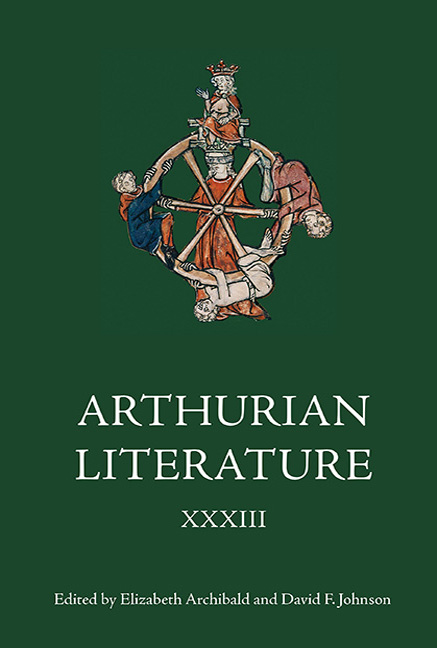Book contents
- Frontmatter
- Contents
- General Editors’ Foreword
- Contributors
- I From ‘The Matter of Britain’ to ‘The Matter of Rome’: Latin Literary Culture and the Reception of Geoffrey of Monmouth in Wales
- II ChrÉtien's British Yvain in England and Wales
- III Edward III's Abandoned Order of the Round Table Revisited: Political Arthurianism after Poitiers
- IV ‘Thanked Be God There Hath Been But A Few Of Myne Auncytours That Hathe Dyed In Their Beddes’: Border Stories and Northern Arthurian Romances
- V T. H. White's Representation of Malory's Camelot
- VI The Old Knight An Edition of the Greek Arthurian Poem of Vat. Gr. 1822
- Miscellaneous Endmatter
- Commentary
- Contents of Previous Volumes
General Editors’ Foreword
Published online by Cambridge University Press: 29 July 2017
- Frontmatter
- Contents
- General Editors’ Foreword
- Contributors
- I From ‘The Matter of Britain’ to ‘The Matter of Rome’: Latin Literary Culture and the Reception of Geoffrey of Monmouth in Wales
- II ChrÉtien's British Yvain in England and Wales
- III Edward III's Abandoned Order of the Round Table Revisited: Political Arthurianism after Poitiers
- IV ‘Thanked Be God There Hath Been But A Few Of Myne Auncytours That Hathe Dyed In Their Beddes’: Border Stories and Northern Arthurian Romances
- V T. H. White's Representation of Malory's Camelot
- VI The Old Knight An Edition of the Greek Arthurian Poem of Vat. Gr. 1822
- Miscellaneous Endmatter
- Commentary
- Contents of Previous Volumes
Summary
This volume of Arthurian Literature ranges from the reception of Geoffrey of Monmouth in Wales to the Camelot of T. H. White. Georgia Henley discusses Latin literary culture in medieval Wales, evaluating the intellectual and literary context in which Geoffrey of Monmouth's seminal Historia regum Britanniae was received. She makes the case for discarding the binary distinction of ‘Welsh vs Latin’ in favour of a view of medieval Wales as a multilingual culture in which Latin and Welsh existed side-by-side and the classical tradition had a significant influence on Welsh literature.
We are pleased to be able to publish a revised version of Prof. Erich Poppe's 2016 O'Donnell Lecture in Celtic Studies, in which he shines a bright comparative light (in terms of both plot and lexis) on Chrétien's Ivain, the Middle English Ywain and Gawain and the Middle Welsh Owein, otherwise known as Chwedyl Iarlles y Ffynnawn (The Tale of the Lady of the Well / Countess of the Spring). In his reading of these poems, Poppe effectively demonstrates Peter Clemoes’ axiom that to read ‘Medieval Welsh literature alongside that of Middle English’ is to recognize how great a debt English literature owes to the Celtic tradition for its Arthurian inspirations.
Christopher Berard returns to the subject of Edward III's abandoned Order of the Round Table to argue that, while Edward's ‘un-Arthurian’ tactics at Crécy made his association with the legendary king problematic, his victory at Poitiers and the capture of the flower of French knighthood – and of Jean II of France himself – rendered that association apt once more. Portraying himself as an Arthurian ‘King of Kings’ enabled Edward to negotiate a treaty with, and seek ransom for, the French king without undermining his own claim to that throne.
Ralph Hanna considers Ywain and Gawain and the Alliterative Morte Arthure in the cultural and political context of the turbulent history of the borders and of two great northern families, the Percys and the Nevilles. In spite of the popular image of the ‘uncouth / violent North’, he argues that northern romances diverge from the popular insular pattern of usurpation, exile and return, focusing instead on more domestic themes and on ‘the failure of mere martial prowess to offer meaningful achievement’. He sees Ywain and Gawain as a response to criticism of romance in texts such as Cursor mundi, stressing the importance of both time and ‘trowth’.
- Type
- Chapter
- Information
- Arthurian Literature XXXIII , pp. vii - viiiPublisher: Boydell & BrewerPrint publication year: 2016

